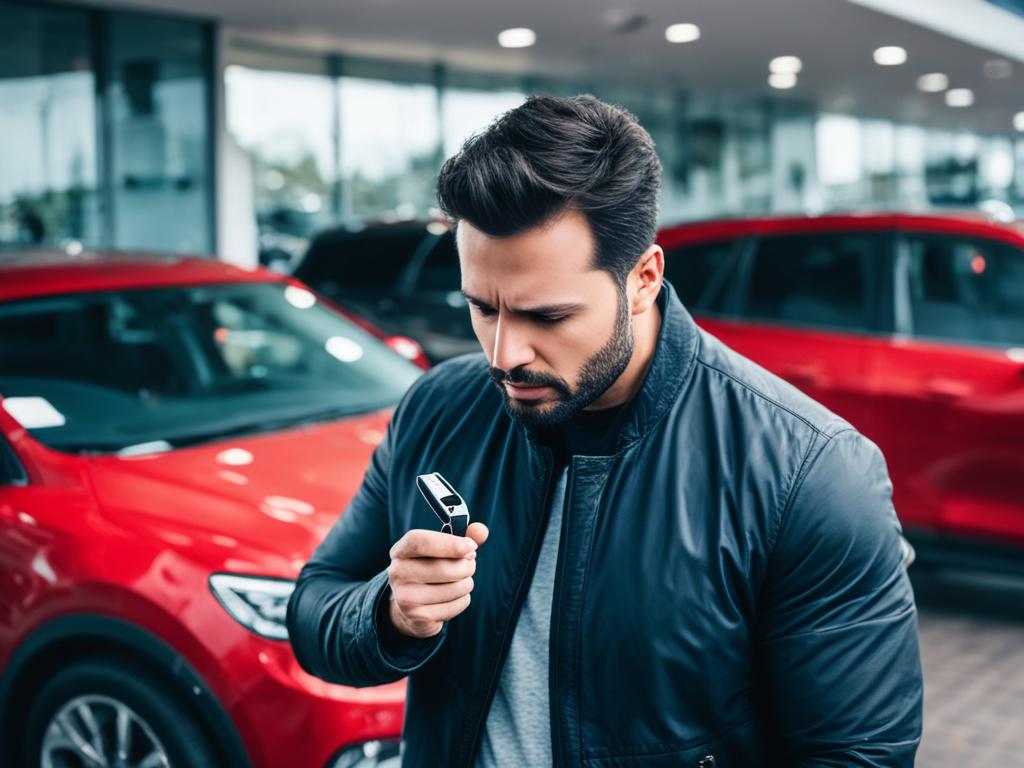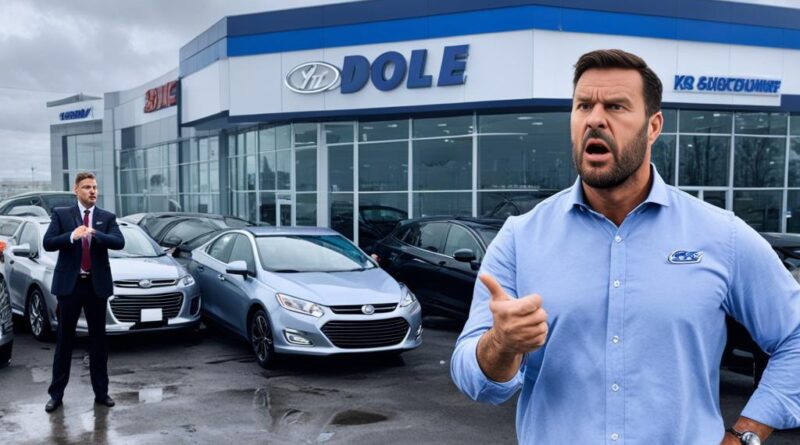Suing a Car Dealership? Know Your Rights & Options.
If you have a dispute with a car dealership, whether it’s over a car you purchased, a refund on a warranty, or a bad title, there are legal options available to you. One option is to sue the car dealership or private seller in small claims court. Examples of lawsuits filed against car dealerships include cases of misleading buyers, selling defective cars, and failing to honor warranties.
Key Takeaways:
- Disputes with car dealerships can be resolved through legal actions like suing in a small claims court.
- Lawsuits against car dealerships can involve issues such as misleading buyers and selling defective cars.
- Understanding your rights and options is crucial in dealing with car dealership disputes.
- State DMVs have buyer’s bills of rights that outline specific laws and regulations for car dealership transactions.
- The Federal Trade Commission (FTC) regulates the car industry and protects consumers against deceptive practices.
Examples of Lawsuits Filed Against Car Dealerships
In legal disputes with car dealerships, lawsuits can provide a pathway to seek resolution and financial compensation for various issues. Here are two examples of real-life lawsuits that shed light on the potential outcomes:
Case 1: Misleading Sales Tactics and Mechanical Problems
In a small claims lawsuit in Los Angeles, a buyer took legal action against a car dealership and their agent for engaging in misleading sales tactics. The buyer alleged that they were deceived into purchasing a car with undisclosed mechanical problems and an unclear title. Seeking $4,500 in damages, the buyer pursued a resolution through the legal system.
“The dealership assured me that the car was in perfect condition and had no problems. However, soon after the purchase, I discovered serious mechanical issues that required expensive repairs. Additionally, I faced challenges with obtaining a clear title for the vehicle.”
After careful evaluation of the evidence and arguments presented by both parties, the court awarded the buyer $1,700 in damages for the costs incurred due to the mechanical problems and the title issues. This case highlights the potential success of lawsuits in holding car dealerships accountable for their deceptive practices.
Case 2: Defective Car Leading to Serious Incident
In another lawsuit, a buyer sued a car dealership for selling a defective car that posed significant safety risks. The buyer’s vehicle unexpectedly experienced a catastrophic failure, resulting in a dangerous incident while driving. Seeking $10,000 in damages, the buyer initiated legal proceedings against the dealership to obtain compensation.
“I was driving the car, and suddenly, the engine malfunctioned, causing a catastrophic failure that put my life in danger. This incident was a direct result of the dealership selling me a defective vehicle.”
After careful examination of the evidence, including expert testimony, the court found the car dealership liable for selling a defective car that posed a severe safety risk to the buyer. The buyer was awarded the full amount sought, receiving $10,000 in damages.
These real-life examples demonstrate the potential outcomes of lawsuits filed against car dealerships. While each case is unique and heavily dependent on the specific circumstances, legal action can offer resolution and justice to buyers who have been wronged by deceptive practices or defective vehicles.
Comparative Overview of Car Dealership Lawsuit Outcomes
| Case | Plaintiff | Defendant | Issue | Damages Sought | Settlement |
|---|---|---|---|---|---|
| Case 1 | Buyer in Los Angeles | Car Dealership & Agent | Misleading sales tactics, mechanical problems, unclear title | $4,500 | $1,700 |
| Case 2 | Buyer | Car Dealership | Defective car leading to serious incident | $10,000 | $10,000 |
Note: The outcomes presented in this table are specific to these individual cases and may not reflect the potential outcomes of similar cases in different contexts or jurisdictions.
Common Types of Small Claims Lawsuits against Car Dealerships & Private Sellers
Small claims lawsuits can be filed against car dealerships or private sellers in various situations. Buyers have legal rights and recourse when it comes to disputes with car dealerships or private sellers. Some common types of small claims lawsuits filed against car dealerships and private sellers include:
1. Mechanical Issues
Buyers may file a small claims lawsuit if the car purchased develops mechanical issues shortly after the purchase. This could include engine problems, transmission issues, or other mechanical failures that significantly affect the car’s performance.
2. Fraudulent Misrepresentation or Advertising
If the car dealership or private seller engages in fraudulent misrepresentation or false advertising, buyers can take legal action. This includes situations where the seller provides misleading information about the car’s condition, history, or features to deceive the buyer.
3. Refusal to Honor Warranties
If a car dealership or private seller refuses to honor a valid warranty on the purchased vehicle, the buyer has the right to file a small claims lawsuit. This could include situations where the seller fails to repair or replace defective parts covered under the warranty.
4. Failure to Issue Refunds
If a buyer is entitled to a refund due to a specific circumstance, such as the discovery of undisclosed damage or misrepresentation by the car dealership or private seller, legal action can be taken. This could include situations where the seller fails to provide a promised refund or fails to acknowledge the buyer’s right to a refund.
5. Failure to Provide Title Documents
Buyers have the right to receive proper title documents for the purchased vehicle. If the car dealership or private seller fails to provide the necessary title documents within the specified time frame, the buyer can file a small claims lawsuit to rectify this issue.
Buyers should consult with a qualified legal professional to understand their rights and determine the best course of action in their specific situation.
| Common Types of Small Claims Lawsuits against Car Dealerships & Private Sellers | |
|---|---|
| Mechanical Issues | Buyers may file a small claims lawsuit if the car purchased develops mechanical issues shortly after the purchase. |
| Fraudulent Misrepresentation or Advertising | Buyers can take legal action if the car dealership or private seller engages in fraudulent misrepresentation or false advertising. |
| Refusal to Honor Warranties | If a car dealership or private seller refuses to honor a valid warranty on the purchased vehicle, the buyer has the right to file a small claims lawsuit. |
| Failure to Issue Refunds | Buyers can file a small claims lawsuit if the car dealership or private seller fails to issue a promised refund. |
| Failure to Provide Title Documents | Buyers have the right to receive proper title documents for the purchased vehicle. If the seller fails to provide them, legal action can be taken. |

Consumer Rights and Buyer’s Bill of Rights
When it comes to car dealership transactions, consumers have specific rights and protections provided by state DMVs through Buyer’s Bills of Rights. These regulations outline the legal framework that governs car buying and selling, ensuring fairness and transparency in the process.
One example of a comprehensive Buyer’s Bill of Rights is implemented by the California DMV. This document covers a range of essential topics, including disclosure requirements, the use of the term “certified” for used cars, and the option for buyers to cancel a contract within 2 days of purchasing a used car. By familiarizing themselves with these rights and regulations, consumers can confidently navigate the car dealership landscape.
The California Car Buyer’s Bill of Rights
The California Car Buyer’s Bill of Rights is a crucial resource for car buyers in the state. It outlines their rights and provides protection against deceptive practices. Key provisions of this bill include:
- Disclosure requirements: Dealers must provide detailed information about the condition of the vehicle, including any known defects or repairs.
- ‘Certified’ used cars: Dealers must meet specific criteria to label a used car as ‘certified,’ ensuring its quality and condition.
- Contract cancellation option: Buyers have the right to cancel a contract within 2 days of purchasing a used vehicle, providing an opportunity to reconsider their decision.
The California Car Buyer’s Bill of Rights serves as a model for other states, emphasizing the importance of consumer protection in car dealership transactions. However, it’s essential for buyers to research and understand the buyer’s rights specific to their own state.
Know Your Rights, Protect Your Interests
By familiarizing themselves with the Buyer’s Bill of Rights in their state, consumers can confidently engage in car dealership transactions, knowing they are protected by legal safeguards. These regulations empower buyers to make informed decisions, insist on fair treatment, and seek recourse if their rights are violated.
Furthermore, being aware of these rights helps buyers hold car dealerships accountable for any misrepresentation, fraud, or violation of consumer protection laws. By exercising their rights, consumers can contribute to the maintenance of fair business practices in the car dealership industry.
Being well-informed about your rights as a car buyer is the first step towards a successful and satisfactory dealership experience. Remember to consult the Buyer’s Bill of Rights applicable in your state and seek legal advice if needed.
Next up, we will explore the regulations set forth by the Federal Trade Commission (FTC) in the context of car dealership transactions and the protection of consumer interests.
Federal Trade Commission (FTC) Regulations
The Federal Trade Commission (FTC) is a federal agency that plays a crucial role in ensuring consumer protection and regulating industries like the car industry. The FTC investigates and takes legal action against individuals and companies engaged in deceptive business practices, including those within the car industry.
One of the main focuses of the FTC is to continuously update and enforce rules and regulations to safeguard consumers from deceptive practices. These regulations are in place to promote fair and transparent business conduct within the car industry, ensuring that consumers have the necessary information to make informed purchasing decisions.
The FTC has specific regulations in place for car dealerships to prevent deceptive practices and protect consumers’ rights. These regulations cover various aspects of the car buying process, including advertising practices, such as “bait-and-switch” techniques, which involve enticing customers with false or misleading information.
By familiarizing yourself with FTC regulations, you can better understand your rights as a consumer and the standards that car dealerships are expected to uphold. This knowledge empowers you to identify and report any potential violations, helping to enforce fair practices within the car industry.
Proposed Changes in FTC Regulations
The FTC is continuously working to strengthen consumer protection in the car industry. As part of their ongoing efforts, the FTC is proposing new rules to address emerging issues and deceptive advertising practices.
“Bait-and-switch” advertising has been a concern for the FTC. We are proposing new rules to close loopholes and provide better protection for consumers. These rules aim to enhance transparency and prevent deceptive practices in car advertising, ensuring that consumers can make well-informed decisions.”
– FTC Spokesperson
To stay up to date with the latest FTC regulations and proposed changes, regularly visit the FTC’s official website or subscribe to their newsletters and publications. By staying informed, you can actively protect your rights and make more confident choices when dealing with car dealerships.
Key FTC Regulations for Car Dealerships
| Regulation | Description |
|---|---|
| Advertising Practices | Prohibits deceptive advertising practices, including “bait-and-switch” techniques, false claims, and misleading representations. |
| Consumer Disclosures | Requires car dealerships to provide accurate and complete information to consumers regarding the condition, history, and warranty coverage of the vehicles they sell. |
| Prohibited Sales Practices | Prohibits unfair and deceptive practices, such as odometer tampering, failure to disclose prior damage or salvage title, and failure to honor warranties. |
| Finance and Loan Practices | Regulates the disclosure of financing terms, interest rates, and fees. Ensures that consumers are provided with clear and accurate information related to their auto loans. |
It is vital to be aware of these regulations and use them as a guideline to protect your consumer rights when interacting with car dealerships. If you believe that a car dealership has violated any FTC regulations, it is advisable to report the incident to the FTC for further investigation and potential legal action.
Lemon Laws and Consumer Protection
Lemon laws serve as a crucial safeguard for consumers who find themselves stuck with cars that have significant defects, rendering them unreliable and unsafe. These laws aim to provide relief and protection to buyers, ensuring they have legal recourse if they purchase a lemon from a car dealership.
All fifty U.S. states have enacted their own lemon laws, each with its own set of standards and procedures. These laws empower consumers to seek compensation in the form of cash settlements, buybacks, or replacement vehicles when they have purchased a defective car.
Under lemon laws, consumers have the right to file a lawsuit against car dealerships if they believe they have been sold a lemon. By pursuing legal action, buyers can hold dealerships accountable for selling faulty vehicles and seek the restitution they deserve.
It’s important for consumers to understand their rights and the lemon laws specific to their state. By familiarizing themselves with the legislation, buyers can protect themselves against car dealership fraud and scams, ensuring they have the necessary tools to fight back when they encounter a lemon.

State Lemon Laws Overview
Each state’s lemon laws may differ in terms of the criteria for a vehicle to be considered a lemon, the number of repair attempts required, and the timeframe for pursuing legal action. Here is an overview of lemon laws in select states:
| State | Criteria | Number of Repair Attempts | Timeframe for Legal Action |
|---|---|---|---|
| California | 4 repair attempts or 30 days out of service | 2 repair attempts for life-threatening defects | Within 18 months or 18,000 miles |
| Texas | 4 repair attempts or 30 days out of service | 2 repair attempts for life-threatening defects | Within 24 months or 24,000 miles |
| New York | 4 repair attempts or 30 days out of service | 1 repair attempt for life-threatening defects | Within 24 months or 18,000 miles |
These examples illustrate how lemon laws can vary, highlighting the importance of understanding the specific regulations in your state to ensure you can effectively pursue legal action against a car dealership.
“Lemon laws provide consumers with valuable protection, enabling them to seek compensation and justice when they unknowingly purchase a defective vehicle.”
Consumers should consult with legal professionals specializing in lemon laws to gain a comprehensive understanding of their rights and how to navigate the complex legal process.
Suing a Car Dealership for Negligence
When purchasing a car from a dealership, it is expected that they will act with a reasonable standard of care towards the buyer. However, if a car dealership fails to meet this standard and their actions or inactions fall below what a reasonable person would have done, it may be possible to sue them for negligence. Examples of negligence in car dealership lawsuits can include lying about the condition of the car or misrepresenting important facts.
To prove car dealership negligence, it is essential to gather evidence that demonstrates the dealership’s failure to meet the standard of care. This can include documenting any false statements made by the dealership, obtaining expert opinions regarding the condition of the car, and collecting any written agreements or contracts that highlight the dealership’s obligations.
If you believe a car dealership has negligently sold you a car, it is important to consult with a lawyer who specializes in car dealership disputes. They can assess the merits of your case, guide you through the legal process, and help you seek compensation for any damages you may have suffered as a result of the dealership’s negligence.
Proving Car Dealership Negligence
Proving car dealership negligence requires establishing the following elements:
- The car dealership owed a duty of care to the buyer.
- The dealership breached that duty of care through their actions or inactions.
- The buyer suffered damages as a result of the dealership’s breach.
Establishing these elements may require presenting evidence such as:
- Statements or advertisements made by the dealership.
- Documentation regarding the condition of the car at the time of purchase.
- Witness testimonies.
- Expert opinions.
Proving car dealership negligence can be a complex process. Consulting with a knowledgeable attorney is crucial to ensure you have a strong case and maximize your chances of success.
What To Do if a Car Seller Never Gave You Title
If a car dealership or private seller fails to provide you with the title to the car you purchased within the time limit set by your state, you have options. You can take legal action to obtain the title you need.
One option is to file a small claims lawsuit against the car seller for not providing the title. This legal action can help you seek compensation or require the seller to fulfill their obligation.
If you prefer to avoid the small claims court process, you can lodge a complaint with your local Department of Motor Vehicles (DMV). They can investigate the matter and enforce the legal requirements regarding title transfer.
Title documents are essential for registering the car in your name and proving ownership. Car sellers, whether dealerships or private individuals, are legally obligated to transfer the title to the buyer. Failure to comply with this obligation can have legal consequences for the seller.
Taking the appropriate legal action is important to protect your rights and ensure that you receive the title to the car you purchased. Without the title, you may face difficulties with registration, insurance, and future resale. By pursuing legal remedies, you can hold the seller accountable and obtain the necessary documentation to complete the transaction.

What To Do if You Bought a “Bad Car” from a Private Seller
Purchasing a car from a private seller comes with its risks. Unlike buying from a car dealership, private sellers often sell cars “as is” without any warranties or guarantees. This means that if you encounter any problems or defects after the purchase, it can be challenging to hold the seller accountable.
When buying a car from a private seller, there are common issues to be aware of:
- Faulty or Defective Car: Private sellers may not disclose all the problems or issues with the car. It’s crucial to thoroughly inspect the vehicle and test drive it before making a purchase.
- Misrepresentation of Car’s History: Some sellers may provide false information about the car’s history, such as previous accidents or title issues. Conducting a vehicle history check can help uncover any potential hidden problems.
- Undisclosed Liens on the Title: The car you are buying may have outstanding loans or liens that the seller fails to disclose. This can lead to complications and additional costs for you as the new owner.
- Lack of Warranties: Unlike car dealerships, private sellers do not offer warranties or guarantees. Once the transaction is complete, any issues with the car become your responsibility.
It’s important to take certain precautions to minimize the risks when buying from a private seller:
- Have a Bill of Sale: Ensure that you have a legally binding bill of sale that outlines the terms and conditions of the sale, including the agreed-upon purchase price, vehicle description, and any warranties or guarantees, if applicable.
- Get the Car Inspected: Schedule an independent inspection with a trusted mechanic before finalizing the purchase. They can identify any existing or potential issues that may not be immediately apparent.
- Research the Market Value: Conduct thorough research on the market value of the specific make, model, year, and condition of the car you intend to buy. This will help you negotiate a fair price and identify any red flags if the seller’s price seems too good to be true.
- Be Cautious of Cash Transactions: Cash transactions can be risky, as they leave no paper trail. Whenever possible, use a certified check or obtain a receipt for your payment.
- Consider a Vehicle History Report: Utilize reputable vehicle history report services to obtain a detailed report on the car’s background, including its title status, accident history, and mileage records.
Taking these precautions can help protect you when buying a car from a private seller. However, keep in mind that if you do encounter issues with the purchased car, your legal options may be limited. Lemon laws typically apply when buying from a car dealership and may not cover private sales. Seek legal advice if you believe the seller intentionally misrepresented the car or violated any laws.

Quote:
“Buying a car from a private seller requires extra caution due to limited legal protections. Conduct thorough inspections, research the market value, and consider obtaining a vehicle history report to minimize risks.”
Examples of Auto Fraud and Deceptive Practices by Car Dealerships
Car dealerships are not immune to engaging in deceptive practices and auto fraud. It is crucial for buyers to be aware of these schemes in order to protect themselves from potential scams. Here are some examples of fraudulent practices commonly seen in car sales:
Odometer Tampering
Odometer tampering is a common form of auto fraud where car dealerships manipulate the mileage on vehicles to make them appear less used than they actually are. By tampering with the odometer, dealerships can deceive buyers into believing that the car has lower mileage, resulting in a higher selling price.
Spot Delivery Scams
In spot delivery scams, dealerships allow buyers to drive off with a car before the financing terms have been finalized. However, after the sale, the dealership may contact the buyer to inform them that the financing fell through and they need to sign a new contract with less favorable terms, such as a higher interest rate or a larger down payment.
Incorrect Credit Scoring
Some car dealerships may manipulate a buyer’s credit score to justify charging higher interest rates. By intentionally misrepresenting a buyer’s creditworthiness, dealerships can exploit buyers and increase their own profits.
Failure to Disclose Damage History
Car dealerships have an obligation to disclose any known damage history of a vehicle to potential buyers. However, some dealerships may intentionally hide or fail to disclose this information, leaving buyers unaware of significant past damages that could affect the car’s value or safety.
Packing Contracts with Unnecessary Items and Services
Dealerships may inflate the cost of a car by adding unnecessary items or services to the contract. This can include things like extended warranties, paint protection, or additional accessories, resulting in buyers paying more than necessary for their purchase.
Being aware of these deceptive practices can help buyers identify potential red flags and take appropriate legal action if necessary. It is crucial to thoroughly research a car dealership and carefully review all documents before making a purchase. Consulting with a lawyer experienced in auto fraud cases can provide valuable guidance and ensure that your rights are protected.

Note: The image above illustrates the deceptive practices used by some car dealerships and emphasizes the importance of being vigilant as a buyer.
Legal Steps to Take When Dealing with Auto Dealer Fraud
If you believe you have been a victim of auto dealer fraud, it is important to take immediate legal action to protect your rights and seek justice. By following these essential steps, you can strengthen your case and increase your chances of obtaining a favorable outcome.
- Gather all relevant documents: Collect any paperwork related to your vehicle purchase, including sales contracts, loan agreements, repair receipts, and correspondence with the dealership. These documents will serve as crucial evidence in your case.
- Try to resolve the issue directly with the dealership: Before pursuing legal action, it is recommended to attempt resolving the matter through direct communication with the dealership. Clearly explain your concerns, present your evidence, and outline your desired resolution.
- Seek the advice of an experienced lawyer: Consult with an attorney who specializes in auto dealer fraud cases. They can assess the strength of your claim, guide you through the legal process, and advocate on your behalf to ensure your rights are protected.
- Consider filing a complaint with a government agency: If negotiations with the dealership prove unsuccessful, you may want to file a complaint with a relevant government agency. Agencies such as the Federal Trade Commission (FTC) or your state’s attorney general’s office may be able to assist you in resolving the dispute.
- Pursue legal action through small claims court: In some cases, you may choose to file a lawsuit in small claims court if the amount in dispute falls within the court’s jurisdictional limits. This option allows individuals to represent themselves without hiring an attorney.
- Hire an attorney for larger claims: If your case involves a significant amount of money or complex legal issues, it is advisable to hire an experienced attorney. They will navigate the intricate legal system on your behalf and maximize your chances of a successful outcome.
By following these legal steps and seeking professional guidance, you can effectively address and pursue a resolution for auto dealer fraud. Remember, every case is unique, so it is essential to consult with an attorney who can provide personalized advice based on your specific circumstances.
Auto Fraud Attorneys and Consumer Protection Laws
Auto fraud attorneys specialize in cases involving car dealership disputes and provide legal representation for consumers who have been subjected to deceptive practices. These attorneys have extensive knowledge of consumer protection laws for car buyers and are experienced in handling various types of car dealership disputes.
When you hire an auto fraud attorney, they will work diligently to protect your rights and seek compensation on your behalf. They will utilize consumer protection laws, such as the Texas Deceptive Trade Practices Act (DTPA), to hold car dealerships accountable for false or misleading business practices.
Consumer protection laws are designed to safeguard consumers from fraudulent activities within the automotive industry. These laws cover a wide range of deceptive practices, including false advertising, odometer tampering, undisclosed damages, and more. By working with an auto fraud attorney, you can take legal action against car dealerships that have violated these laws and seek justice for any harm caused.
Auto fraud attorneys have the expertise and resources to navigate complex legal processes and build strong cases on behalf of their clients. They will gather evidence, interview witnesses, negotiate with the opposing party, and, if necessary, represent you in court. Having a skilled attorney by your side can significantly increase your chances of obtaining fair compensation.
Understanding the Texas Deceptive Trade Practices Act (DTPA)
The Texas Deceptive Trade Practices Act (DTPA) is a powerful tool for consumers who have been victims of deceptive practices by car dealerships. Under the DTPA, consumers have the right to seek legal remedies if they can prove that they suffered financial losses due to a car dealership’s deceptive actions.
Common examples of car dealership practices that may be considered deceptive under the DTPA include:
- Misrepresenting the condition or history of a vehicle
- Failing to disclose known defects
- Engaging in fraudulent advertising
- Providing false information about warranty coverage
If you believe you have a valid claim under the DTPA, it is crucial to consult with an auto fraud attorney who can assess the merits of your case and guide you through the legal process.
Seeking Legal Representation for Car Dealership Disputes
When facing a car dealership dispute, it is essential to have competent legal representation that specializes in auto fraud cases. An experienced attorney will protect your rights, help you understand the legal options available, and navigate the complexities of the legal system.
Here are some key advantages of hiring an auto fraud attorney:
- Expertise: Auto fraud attorneys have in-depth knowledge of consumer protection laws and extensive experience in handling car dealership disputes.
- Negotiation Skills: They possess strong negotiation skills to help you achieve a fair settlement with the dealership.
- Lawsuit Preparation: If a settlement cannot be reached, an attorney will proficiently prepare your case for litigation, ensuring that your rights are vigorously defended.
- Legal Resources: Auto fraud attorneys have access to resources, including expert witnesses, investigators, and industry professionals, that can strengthen your case.
By hiring an auto fraud attorney, you gain a legal advocate who will fight to protect your rights, ensure fair treatment, and seek the compensation you deserve in your car dealership dispute.

| Benefits of Hiring an Auto Fraud Attorney | Examples |
|---|---|
| Expertise in auto fraud cases | Assessing the validity of your claim based on deceptive practices |
| Knowledge of consumer protection laws | Utilizing the Texas Deceptive Trade Practices Act (DTPA) to protect your rights |
| Strong negotiation skills | Achieving a fair settlement with the car dealership |
| Legal resources and connections | Accessing expert witnesses and industry professionals for case support |
| Lawsuit preparation and representation | Preparing your case for litigation and vigorously defending your rights |
What to Consider Before Suing a Car Dealership
Before deciding to sue a car dealership, it’s important to consider all options. Attempting to resolve the issue directly with the dealership, seeking legal advice, and filing complaints with government agencies may provide alternative solutions. Suing a car dealership can be a complex and time-consuming process, so it’s crucial to be prepared and consult with a lawyer to determine the best course of action for your specific situation.
- Consider Alternative Solutions: Before taking legal action, explore other avenues that may lead to a resolution. Attempt to communicate with the dealership to address your concerns and find a mutually acceptable solution.
- Seek Legal Advice: Consulting with an attorney who specializes in car dealership disputes can provide valuable insights into your rights and options. They can evaluate your case, provide guidance on the legal process, and help you understand the potential outcomes of a lawsuit.
- File Complaints: Filing complaints with government agencies such as the local consumer protection division or the Better Business Bureau can bring attention to the dealership’s practices and potentially lead to a resolution.
By considering these factors and exploring alternative options, you can make an informed decision on whether suing a car dealership is the most appropriate course of action for your specific circumstances.

Important Considerations in Suing Car Dealerships
When considering legal action against a car dealership, it’s crucial to take certain important factors into account. By following these considerations before suing, you can make well-informed decisions and navigate the legal process more effectively. Remember, it’s always recommended to consult with a lawyer specializing in car dealership disputes to ensure you have the best possible guidance throughout your case.
Gather All Relevant Documents
Before proceeding with a lawsuit, gather all relevant documents related to your car purchase and any subsequent disputes. This includes sales contracts, warranty agreements, repair records, correspondence with the dealership, and any evidence of misrepresentation or fraudulent practices. These documents will provide crucial evidence and support your case.
Attempt to Resolve the Issue Directly
Prior to initiating legal action, consider contacting the car dealership directly to resolve the issue. Express your concerns and provide an opportunity for them to address the problem. Some disputes can be resolved through negotiation or mediation, which may save you time, money, and the stress of a lawsuit.
Seek the Advice of a Lawyer
Consulting with a lawyer who specializes in car dealership disputes is highly recommended. They can evaluate your case, provide legal advice, and guide you through the entire legal process. A knowledgeable lawyer will have experience in handling similar cases and can help you understand your rights and options.
File Complaints with Government Agencies
If the car dealership has engaged in deceptive or fraudulent practices, consider filing complaints with relevant government agencies. This can include your local consumer protection agency, the Better Business Bureau, or the Federal Trade Commission (FTC). These agencies can investigate the dealership and take appropriate action against them.
Understanding the Legal Process
Before proceeding with a lawsuit, it’s important to have a clear understanding of the legal process and the potential outcomes. Familiarize yourself with the court system in your jurisdiction, the rules and procedures for filing a lawsuit, and the possible remedies available to you.
Avoid Unnecessary Stress and Costs
Remember that suing a car dealership can be a lengthy and costly process. It’s important to weigh the potential benefits against the stress, time commitment, and financial costs involved. Consider alternative dispute resolution methods such as mediation or arbitration, which may provide a quicker and more cost-effective resolution.
By carefully considering these important aspects and seeking appropriate legal advice, you can make informed decisions regarding suing a car dealership. Remember to gather all necessary documentation, attempt to resolve the issue directly, consult with a lawyer, and file complaints with relevant government agencies if necessary. Understanding the legal process and the potential outcomes can help you navigate through the complexities of a car dealership lawsuit.
Conclusion
Suing a car dealership is a significant decision that should be made based on individual circumstances. It is crucial to have a clear understanding of your rights and options before proceeding with legal action. Seeking legal advice from an attorney experienced in car dealership lawsuits can provide valuable guidance and help you navigate the complex process.
Before filing a lawsuit, consider exploring alternative solutions such as direct communication with the dealership, attempting to resolve the dispute amicably, or filing complaints with appropriate government agencies. These steps can potentially lead to a faster and more satisfactory resolution.
Remember that each case is unique, and the outcome of a car dealership lawsuit depends on specific details and facts of the dispute. The ultimate goal is to protect your rights, seek justice, and find a fair resolution. Taking the time to gather all relevant documents, understand the legal process, and consult with professionals will contribute to making an informed decision.
In conclusion, while suing a car dealership can be a challenging and time-consuming process, it may be necessary to ensure the protection of your rights as a consumer. By thoroughly assessing your situation, seeking legal advice, and exploring alternative solutions, you can make an informed decision about the best course of action to pursue. Ultimately, the aim is to find a resolution that is fair, just, and satisfactory to all parties involved.
FAQ
Can I sue a car dealership if I have a dispute with them?
Yes, you can sue a car dealership if you have a dispute, whether it’s over a car you purchased, a warranty refund, or a title issue. Legal options like small claims court are available to you.
What are some examples of lawsuits filed against car dealerships?
Lawsuits against car dealerships can include cases of misleading buyers, selling defective cars, and failing to honor warranties. For example, a buyer sued a dealership for misleading them into buying a car with mechanical problems and an unclear title, while another sued for selling a defective car that “blew up” while driving.
What are common types of small claims lawsuits against car dealerships?
Common types of small claims lawsuits against car dealerships or private sellers include cases where the car has mechanical issues shortly after purchase, fraudulent misrepresentation, refusal to honor warranties, failure to issue refunds, and failure to provide title documents.
What are my consumer rights when dealing with car dealerships?
Many state DMVs have Buyer’s Bills of Rights that outline specific laws and regulations related to car dealership transactions. It’s important to be aware of your rights and the regulations in your state, such as disclosure requirements and cancellation options.
What are the FTC regulations for car dealerships?
The FTC is a federal agency that investigates and prosecutes individuals and companies engaged in deceptive business practices. Familiarizing yourself with FTC regulations can help you understand your rights and make informed purchasing decisions.
What are lemon laws and how do they protect consumers?
Lemon laws are designed to protect consumers who purchase cars with significant defects that cannot be repaired. Each state has its own lemon laws that provide consumers with relief in the form of cash settlements, buybacks, or replacement vehicles.
Can I sue a car dealership for negligence?
Yes, if a car dealership has failed to meet the standard of care owed to you, such as lying about the car’s condition or misrepresenting important facts, you may have grounds for a negligence lawsuit.
What can I do if a car seller never gave me the title?
If a car dealership or private seller fails to provide you with the title to the car you purchased within the time limit set by your state, you can take legal action by filing a small claims lawsuit or a complaint with your local DMV.
What should I do if I bought a “bad car” from a private seller?
When buying from a private seller, there are risks such as buying a faulty car or facing misrepresentation of the car’s history. Lemon laws may not apply in these cases, so it’s important to have a bill of sale and get the car inspected by an independent mechanic.
What are some examples of auto fraud by car dealerships?
Auto fraud by car dealerships can include odometer tampering, spot delivery scams, incorrect credit scoring, failure to disclose a vehicle’s damage history, and packing contracts with unnecessary items and services.
What legal steps should I take when dealing with auto dealer fraud?
Gather all relevant documents, try to resolve the issue directly with the dealership, seek the advice of a lawyer experienced in dealer fraud cases, and consider filing a complaint with a government agency. You may choose to pursue legal action through small claims court or by hiring an attorney.
What can auto fraud attorneys do to help with car dealership disputes?
Auto fraud attorneys specialize in cases involving car dealership disputes and can help consumers seek compensation for deceptive practices and violations of consumer protection laws. They use laws such as the Texas Deceptive Trade Practices Act (DTPA) to protect consumers against false or misleading business practices.
What should I consider before suing a car dealership?
Before suing a car dealership, consider attempting to resolve the issue directly, seeking legal advice, and filing complaints with government agencies if necessary. Suing a car dealership can be complex, so it’s crucial to be prepared and consult with a lawyer.
What are important considerations in suing a car dealership?
Important considerations in suing a car dealership include gathering relevant documents, attempting to resolve the issue directly, seeking legal advice, and understanding the legal process and potential outcomes of a lawsuit.
Is suing a car dealership always the best option?
Suing a car dealership is a serious decision that should be based on individual circumstances. Before taking legal action, consider your rights, options, and alternative solutions. Seeking legal advice and exploring other avenues may provide a more satisfactory resolution.




